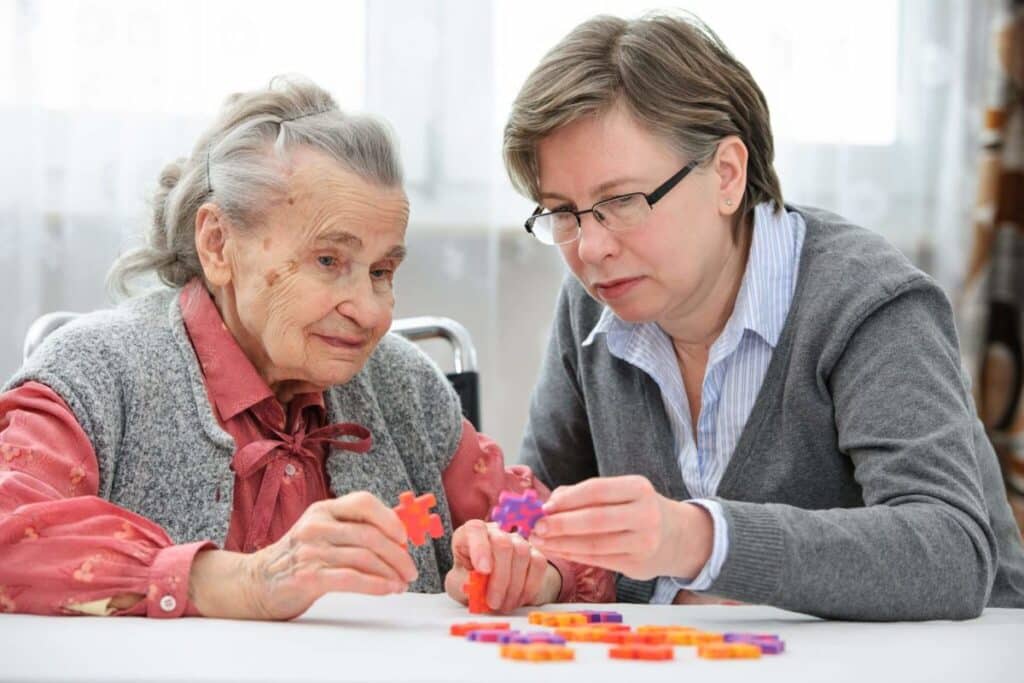Memory care for dementia in Alpharetta, Georgia
A Legacy is Worth Preserving
When Alzheimer’s or another dementia-related condition arrives to steal treasured memories, someone you care for may be in peril. That’s why at The Mansions at Alpharetta, memory care is our primary focus, for their legacy, for their safety, it’s why we exist.
Have you noticed any warning signs of memory loss in a loved one? Download our FREE Memory Care Guide to learn more and get in touch TODAY.
Memory, Forgetfulness, and Aging: What's normal and what's not.
We all forget things here and there. As we age, it’s also common to find ourselves searching our brains for facts we used to know, or the name of that familiar face at the grocery store. However, there may come a point where the memory loss and forgetfulness become severe or more concerning. When you start to notice these signs, it’s important to consult with their doctor to properly assess whether what’s being experienced is normal, or not.
Common warning signs that memory loss may be abnormal:
- Inability to perform day-to-day tasks like driving
- Repeatedly asking the same questions
- Disorientation
- Difficulty with language
- Mood changes
- Problems with judgment, and more...
Download our FREE Memory Care Guide to learn more about memory loss and get in touch TODAY.

Memory Loss, Although Common, Is Not The ONLY Sign Of Dementia.
When the signs of dementia are there, it’s time to talk with medical professionals who specialize in dementia and have them make a complete assessment. The devastating effects are real and can not only destroy memories, but they can destroy lives.
Fortunately, help is available. Download our FREE memory care guide to learn more.
five signs of early on-set dementia
01.
Confusion
If you find that a family member is asking a question, or questions, over and over; if they are confusing the faces/names of family members; or have begun placing common kitchen items or bathroom items, etc. in the wrong areas, such as putting the ice cream in the pantry instead of the freezer — these could be early signs of dementia.
02.
Mixing Words
Forgetting vocabulary and the meaning of simple words or using them in the wrong context could be early signs of dementia. Maybe a family member is mixing words like "coffee" with "tea" or "sink" with "bin."
03.
Following Directions
If you notice a family member struggling with basic instructions, having trouble following procedures such as a simple cooking recipe, taking medications at the wrong time or wrong dose, paying bills improperly, etc., these could be the effects of dementia.
04.
Inability To Control Emotion
If a family member or loved one is always joyful and happy but than suddenly may become confused, suspicious, depressed, fearful or anxious this can be a sign of dementia. This may be more of a struggle when in environments that are out of their comfort zone.
05.
Lack of personal hygiene
If you notice common hygiene practices and general self care becoming an issue, such as failure to shower or bathe, or forgetting to eat daily meals — these are worrisome problems that could be the results of cognitive impairment and dementia.
According to data compiled by the CDC, there are approximately 5.8 million people living in the United States who battle Alzheimer’s disease and other dementia-related conditions. Those numbers are growing as our population ages, and many cases may go unreported or undiagnosed often leaving those suffering until a crisis occurs. There’s really no way to gloss over the frightening possibilities that exist when dementia erodes cognitive ability.
Download our FREE Memory Care Guide and learn how we can help when any number of these signs become apparent.
five signs of early
on-set dementia
According to data compiled by the CDC, there are approximately 5.8 million people living in the United States who battle Alzheimer’s disease and other dementia-related conditions. Those numbers are growing as our population ages, and many cases may go unreported or undiagnosed often leaving those suffering until a crisis occurs. There’s really no way to gloss over the frightening possibilities that exist when dementia erodes cognitive ability.
Download our FREE Memory Care Guide and learn how we can help when any number of these signs become apparent.
01.
Confusion
If you find that a family member is asking a question, or questions, over and over; if they are confusing the faces/names of family members; or have begun placing common kitchen items or bathroom items, etc. in the wrong areas, such as putting the ice cream in the pantry instead of the freezer — these could be early signs of dementia.
02.
Mixing Words
Forgetting vocabulary and the meaning of simple words or using them in the wrong context could be early signs of dementia. Maybe a family member is mixing words like "coffee" with "tea" or "sink" with "bin."
03.
Following Directions
If you notice a family member struggling with basic instructions, having trouble following procedures such as a simple cooking recipe, taking medications at the wrong time or wrong dose, paying bills improperly, etc., these could be the effects of dementia.
04.
Inability To Control Emotion
If a family member or loved one is always joyful and happy but than suddenly may become confused, suspicious, depressed, fearful or anxious this can be a sign of dementia. This may be more of a struggle when in environments that are out of their comfort zone.
05.
Lack of personal hygiene
If you notice common hygiene practices and general self care becoming an issue, such as failure to shower or bathe, or forgetting to eat daily meals — these are worrisome problems that could be the results of cognitive impairment and dementia.
Have you seen these signs in a loved one?
The Mansions at Alpharetta is here to help
We are an engaging community that focuses on wellness and the stimulation of cognitive pathways that may help improve memory so residents can continue to live the full, rewarding lives that they’ve built.
Our team members go through rigorous and extensive training built upon four foundations of advanced development — physical, social, intellectual and spiritual, all designed to help residents thrive in their amazing lives while continuing to live independently.
Download our FREE Memory Care Guide to learn how our team can help.
The Mansions at Alpharetta, Georgia
Valeo™ Memory Care Nieghborhood
Our Valeo™ Memory Care is an engagement program we’ve designed to increase social interaction and stimulate cognitive abilities. This is not a cookie-cutter approach. We build programs tailored to individuals, not to aggregate data pools. In other words, we work with people, one-on-one. We get to know them on a deeper level as we ask questions and interview family members to compile a complete picture of who they are and the fantastic lives they’ve led. Engagement programs are designed according to an individual’s specific skills and abilities, so nothing is based on a one-size-fits-all method; everything is specific to the person, and it doesn’t get more personal than that!
Download our FREE Memory Care guide to learn more about our signature programs and how they can help someone you love to truly thrive.
The Mansions at Alpharetta, Georgia
Valeo™ Memory Care Nieghborhood
Our Valeo™ Memory Care is an engagement program we’ve designed to increase social interaction and stimulate cognitive abilities. This is not a cookie-cutter approach. We build programs tailored to individuals, not to aggregate data pools. In other words, we work with people, one-on-one. We get to know them on a deeper level as we ask questions and interview family members to compile a complete picture of who they are and the fantastic lives they’ve led. Engagement programs are designed according to an individual’s specific skills and abilities, so nothing is based on a one-size-fits-all method; everything is specific to the person, and it doesn’t get more personal than that!
Download our FREE Memory Care guide to learn more about our signature programs and how they can help someone you love to truly thrive.
The Mansions at Alpharetta, Georgia
stories from Family Members & residents
Precious Memories
Are Their Legacy.
Recapturing Them Is Ours.
We understand that this is one of the most important decisions of their life, and yours. If you have questions, we’d love to meet you to discuss the many ways that our team members provide the support and engagement that can stimulate cognition, and help recapture their precious memories. All in a community that is safe, personal, social, and filled with love.
Download our free Memory Care Guide and get in touch TODAY.

